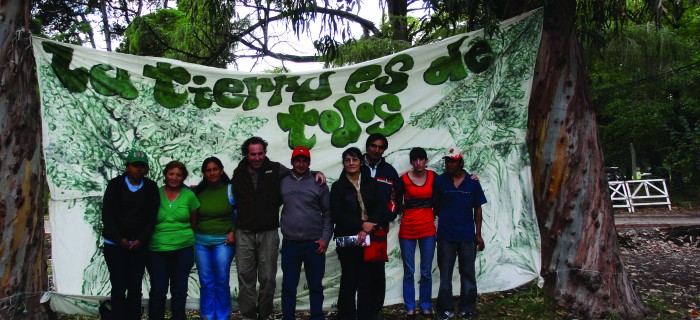Land Conflicts in Argentina: From resistance to systemic transformation
December 2013, Land & Sovereignty Brief No. 4
In Latin America, a region rich in farmland and minerals, the exploitation of natural resources for export has intensified, especially following the 2008 surge in commodity prices and the emergence of China as a large buyer of cash crops. Following Argentina’s economic crisis in 2001, the country leaned heavily on mining and large-scale agribusiness (especially soy) to reinvigorate its ailing economy. The expansion of these industries requires the accumulation of new lands and the displacement of current occupants by way of violence, economic pressure or expropriation. Many peasant farmers and indigenous communities don’t have titles to their lands, leaving them vulnerable to displacement or criminal charges for squatting.
Peasant resistance to this new scramble for land has focused primarily on gaining secure land tenure and legal recognition of territorial rights by strategically engaging with the legal system. However, these movements also recognize that land titles don’t go far enough to address the systemic issues driving the dispossession of peasants and indigenous peoples. Consequently, groups like Argentina’s National Peasant and Indigenous Movement (Movimiento Nacional Campesino Indígena, MNCI) are developing new forms of political education that aim to both increase the effectiveness of legal strategies and promote the kind of collective analysis and action needed for more far-reaching structural change.
This is the fourth brief in the Land & Sovereignty in the Americas series, co-published by Food First and the Transnational Institute.
Argentina promoted the expansion of mining and soy to fuel its ailing economy in the wake of its 2001 crisis. Peasant movements are resisting this assault on their lands and fighting to transform the system.
About the series:
The Land & Sovereignty in the Americas series pulls together research and analysis from activists and scholars working to understand and halt the alarming trend in “land grabbing”—from rural Brazil and Central America to US cities like Oakland and Detroit—and to support rural and urban communities in their efforts to protect their lands as the basis for self-determination, food justice and food sovereignty. The series—which includes short issue briefs and books—is a project of the Land & Sovereignty in the Americas (LSA) activist-researcher collective, coordinated by Food First. For media inquiries about this series, or to arrange an interview with an author, please contact land@foodfirst.org or call (510) 654-4400, ext. 234.
About the author:
Stay in the loop with Food First!
Get our independent analysis, research, and other publications you care about to your inbox for free!
Sign up today!Zoe Brent (zoebrent@foodfirst.org) is a PhD student ad the Institute of Social Studies in The Hague, Netherlands and a fellow at Food First.


 Help Food First to continue growing an informed, transformative, and flourishing food movement.
Help Food First to continue growing an informed, transformative, and flourishing food movement.




